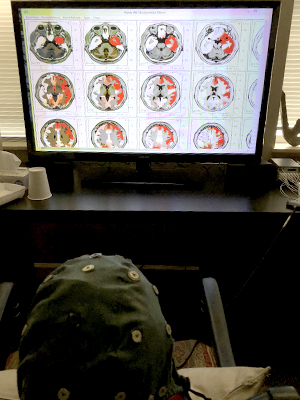
Brainwave tracking technology is being used to treat some of the most challenging mental health conditions.
Imagine being able to lower the impact of unhealthy thoughts through visualization. Technological advances are bringing health care one step closer to managing mental health conditions that are difficult to treat with medications using videogame-like computer software.

Vancouver Coastal Health Research Institute scientist Dr. Carl Laird Birmingham uses a piece of brain imaging technology called Low Resolution Electromagnetic Tomography (LORETA) to treat mental health conditions such as anorexia nervosa. Anorexia is a mental health-related eating disorder that manifests itself through food restriction and a fear of gaining weight. The LORETA neurofeedback technology tracks brainwaves—electrical pulses from neurons in the brain—through wires that run from a computer to sensors placed on a patient’s scalp.

In his latest research—published in the journal Eating and Weight Disorders in March 2018—Birmingham used LORETA to compare brain activity in anorexia nervosa patients and control subjects. His research found that when patients with anorexia were shown images of high-calorie food, the fear centers in their brains were activated in ways similar to when someone without anorexia is shown images of spiders and other frightening things.
“Our results show the significant role fear of food plays in anorexia. LORETA can be used as part of a suite of treatments designed to decrease this fear.”
There is presently no cure for anorexia, and the condition is highly difficult to treat. Around one per cent of women and less than one per cent of men in Canada will develop anorexia during their lifetime with onset typically occurring in the teenage years, says Birmingham. Of these patients, about 50 per cent will never get better.
The condition is usually best treated during its earlier stages—within six months to one year. Current treatments include supplementing patients’ diets with zinc, prescription medications and psychological therapy. However, 40 per cent of patients who receive treatment relapse within one year. That figure rises to 70 per cent within two years.
“Anorexia reduces the life expectancy of patients in BC by 22 years on average. It is a relatively common disease that has a prognosis as bad as many types of cancer.”
Reward-based game could help patients with mental health disorders
The LORETA brainwave scanning technology displays the neural activity inside of a patient’s brain as a series of upwards and downwards lines on a computer screen. These lines represent how areas of the brain react to what a patient is thinking and feeling. In Birmingham’s study, when a patient with anorexia is shown an image of high-calorie food, the lines in parts of the brain that react to fearful situations rise. To treat this, Birmingham asks patients to concentrate on lowering that line. When it reaches or goes below a threshold, a song of the patient’s choosing plays. This technique is called operant conditioning.
“The brain is constantly listening to what is happening around you. Operant conditioning is basically teaching the brain that to receive the reward of hearing a song the patient enjoys, it needs to adjust its electrical pulses to a certain level. It is like receiving points for completing a task in a video game.”

Operant conditioning could be applied to other brain-related illnesses and traumas, as well. After being struck by a truck while cycling in 1998, Birmingham began using LORETA to treat his brain injury and the post-traumatic stress disorder he developed as a result of the accident. At his Vancouver clinic, he also treats others with head traumas and mental health disorders.
In the future, Birmingham predicts that operant conditioning tools could be available for household use to treat a variety of illnesses.
“Many psychological disorders have not seen as many treatment advances as most other medical conditions,” says Birmingham. “We need to do more to explore novel treatment options to work towards improved outcomes for patients.”


